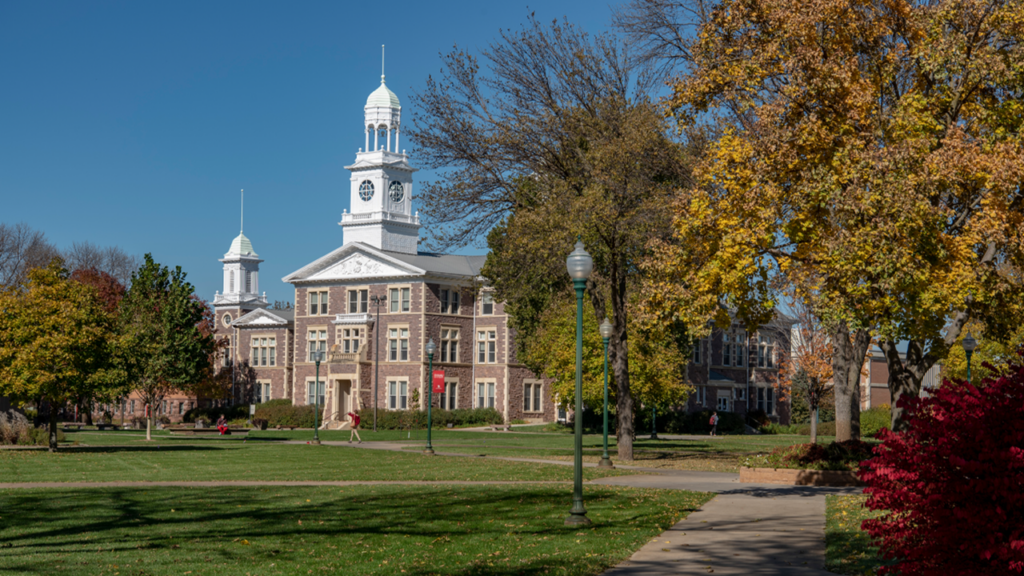The University of South Dakota campus. (Courtesy of University of South Dakota)
A University of South Dakota art professor facing the loss of his job over his online comments about the killing of Charlie Kirk filed a lawsuit Tuesday seeking to stop the university and state Board of Regents from terminating his employment.
Michael Hook, a tenured art professor, is alleging his placement on administrative leave and impending termination are a violation of his constitutional right to free speech. Hook wrote social media posts on his personal account in reaction to the killing of Kirk, a prominent conservative political commentator who was fatally shot on Sept. 10 during a public event a Utah university.
Hook’s first post on Sept. 10 after the shooting included profanity and used a derogatory term to describe Kirk. Hook questioned the difference in coverage and “concern” between Kirk’s killing and the killing of a Minnesota legislator this summer and other school shootings.
He deleted the original and posted an apology “to those who were offended” three hours later.
South Dakota political leaders, including Republican Gov. Larry Rhoden and Republican House Speaker Jon Hansen, criticized Hook and publicly supported his termination.
Trump headlines Arizona memorial service for Charlie Kirk at packed stadium
Other educators around the country are also facing termination or discipline after sharing opinions on social media about the killing. An Iowa teacher, a South Carolina teacher aide and a Ball State employee filed lawsuits over their terminations following social media posts. A Sioux Falls School District staff member was terminated last year after she made a social media post about an assassination attempt on President Donald Trump.
Hook’s lawsuit says his impending termination and the South Dakota Board of Regents’ “overbroad regulation of speech” will have a chilling effect on free speech in the state for professors, students and citizens.
Hook and his attorney, Jim Leach, of Rapid City, filed the lawsuit in South Dakota federal court, calling the premise for the termination “vague, overbroad and unconstitutional.” The lawsuit seeks orders preventing retaliation against Hook, ending his administrative leave and canceling a Sept. 29 personal conference with him.
The lawsuit says Hook’s social media posts are protected political speech under the U.S. Constitution and do not impact his professional role at the university.
“The debate about Mr. Kirk’s beliefs is for the marketplace of ideas,” the lawsuit says. “The First Amendment guarantees the marketplace stays open. The government may not punish people for their ideas.”
The Board of Regents filed an intent to fire Hook after the post circulated online. Spokeswoman Shuree Mortenson said the organization doesn’t comment on pending litigation.
The University of South Dakota notified Hook about his imminent termination on Sept. 12, based on the system’s termination policy regarding “neglect of duty, misconduct, incompetence, abuse of power or other actions that manifest an unfitness to discharge the trust reposed in public university faculty members or to perform assigned duties.”
Under the policy, Hook is able to attend a personal conference “to discuss” his planned termination. Hook is placed on administrative leave until he is officially fired or another decision is made.
The employee code of conduct establishes that when faculty “speak or write as private citizens on matters of public concern” they are “free of institutional censorship or discipline.” At the same time, their “special position in the community imposes special obligations.”
“As learned people and as educators, they should remember that the public may judge their profession and their institution by their utterances,” the policy says. “Hence, they should at all times be accurate, show respect for the opinions of others and make every effort to indicate when they are not speaking for the institution.”
GET THE MORNING HEADLINES.





